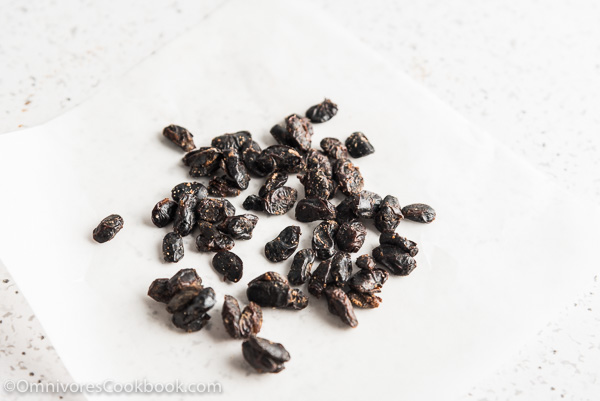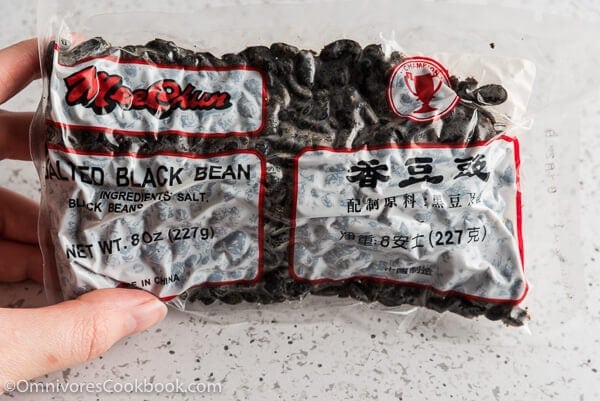This is one of the most useful Chinese sauces because it goes well with almost anything. You can stir-fry, bake, grill, or steam with it.
If you like Chinese food, you should keep a jar of ready-made black bean sauce in your fridge. Here are the reasons:
Black bean sauce is a staple in Chinese cooking, loved for its rich, savory umami flavor. But is this popular sauce actually good for you? This comprehensive article examines the nutritional profile of black bean sauce to determine if it deserves a place in a healthy diet.
What is Black Bean Sauce?
Black bean sauce originates from the Sichuan province of China. It is made from fermented black soybeans, along with ingredients like garlic, ginger, sugar, and starch. The fermentation process gives the sauce its signature dark color and distinct savory taste.
This sauce adds a wonderful depth of flavor to stir-fries, noodle and rice dishes marinades and dipping sauces. It has become a beloved staple around the world. But before adding it to your regular recipe rotation, it is wise to analyze the nutrition facts.
Key Nutrients in Black Bean Sauce
Here are some of the key nutrients found in black bean sauce
- Protein – High quality, providing essential amino acids
- Fiber – Promotes satiety and healthy digestion
- Iron – Critical for oxygen transport and energy production
- Manganese – Aids bone health and metabolism
- Antioxidants – Helps neutralize free radicals to reduce cellular damage
Black bean sauce delivers a nutritional punch, packing in protein, fiber, vitamins, minerals, and protective antioxidants like isoflavones.
Potential Concerns with Black Bean Sauce
However, there are a few potential concerns to consider regarding black bean sauce:
Sodium Content
Like many condiments, black bean sauce is quite high in sodium. Per tablespoon, it provides around 230 mg sodium, which is 10% of the recommended daily value. For individuals limiting sodium due to hypertension or other health conditions, this can be concerning.
Histamine Levels
The fermentation process increases histamine levels in black bean sauce. For those with histamine intolerance, this sauce may trigger headaches, hives, digestive issues, and other symptoms.
Tyramine Content
Tyramine is another biogenic amine produced by fermentation. It can cause hypertension in those taking MAO inhibitors. Levels are generally low in black bean sauce, but it’s something to be aware of.
Mold Contamination
Improper fermentation and storage can lead to mold growth. Consuming moldy black bean sauce could cause health issues, so vigilance is required.
Weighing the Pros and Cons
Clearly black bean sauce has some excellent nutritional components but also potential risks. Here is a balanced look at the pros and cons:
Pros:
- Rich in protein, fiber, vitamins, and minerals
- Provides antioxidants that promote health
- Enhances flavor without needing extra salt or fat
- Easy way to add plant-based protein and iron to meals
- Shelf-stable and convenient ingredient for a variety of dishes
Cons:
- High levels of sodium are concerning, especially for those limiting salt intake
- Fermentation increases histamine and tyramine content
- Improper storage can lead to hazardous mold growth
- May trigger headaches, hives, and digestive issues in some people
Is Black Bean Sauce Ultimately Healthy?
Analyzing the nutritional information and potential concerns shows that black bean sauce can indeed be part of a healthy diet for most people when used in moderation. Here are some tips for enjoying black bean sauce while optimizing its nutritional benefit:
- Check for low sodium varieties to help reduce salt intake
- Store properly refrigerated once opened to prevent mold growth
- Consume reasonable serving sizes, about 1-2 tablespoons per meal
- Avoid if you have histamine intolerance or are taking MAO inhibitors
- Balance intake with hydration to counter sodium effects
- Pair with fresh vegetables, lean proteins, and whole grains for well-rounded nutrition
With mindfulness regarding portion sizes and mitigating risks, black bean sauce can be a nutritious addition to your diet and cooking repertoire.
Healthy and Delicious Ways to Use Black Bean Sauce
Here are some nutritious recipes that highlight black bean sauce:
Black Bean Sauce Chicken
- Lean protein from boneless, skinless chicken breasts
- Veggies such as bell peppers, broccoli, and snap peas
- Served over brown rice for whole grains
- Sauce provides flavor without needing much sodium
Black Bean Eggplant
- Fiber, antioxidants, and phytonutrients from fresh eggplant
- Toasted sesame oil provides healthy fats
- Bean sauce gives rich flavor to balance eggplant’s bitterness
- Low carb and vegetarian
Black Bean Sauce Tofu Stir-Fry
- Plant-based protein from firm tofu
- Rainbow of antioxidant-rich veggies like carrots, cabbage, onions
- Bean sauce integrated into sauce along with low-sodium soy sauce
- Brown rice noodles offer fiber and nutrients
With some creativity, black bean sauce can be incorporated into varied healthy dishes focused on lean proteins, fresh produce, whole grains, and healthy fats.
Should You Consume Black Bean Sauce?
Black bean sauce is high in several nutrients like protein, fiber, vitamins, and minerals. However, it also contains high sodium levels and biogenic amines produced during fermentation. Overall, black bean sauce can be enjoyed in moderation as part of a balanced diet for most people. But it is wise to take precautions regarding portion size, storage, and interactions with certain medications and conditions. If you have specific health concerns or sodium restrictions, discuss integrating black bean sauce into your diet with your healthcare provider.
Satisfy Your Taste Buds Without Sacrificing Nutrition
For most people, black bean sauce is a flavorful way to add nutrition to your diet when used properly. With some mindfulness, it can be incorporated into delicious recipes focused on lean proteins, fresh produce, whole grains, and healthy fats for maximum nutritional benefit. Savor the rich, savory taste of black bean sauce while still achieving a balanced, nutritious meal.

( Marinate and prep the protein.
Mix together 1 tablespoon of peanut oil, 1/2 teaspoon of salt, and 1 tablespoon of cornstarch for every pound of meat or seafood you want to stir-fry. Let it marinate for 5 to 10 minutes. Skip this step if you’re using the sauce to bake, grill, or pan fry.
Soy sauce and honey should be mixed with tofu for 10 to 15 minutes before you cook it in a stir-fry. Drain and coat with a thin layer of cornstarch. See this post to learn how to cook crispy tofu without deep-frying. Skip this step if you use the sauce (and stock) to braise tofu.
Basic ingredient – fermented black beans
The most important ingredient is fermented black bean. It has a strong umami flavor that is like soy sauce but different and even stronger. This is the base of the sauce.

Thanks to almighty Amazon, you can even purchase the fermented black beans online without a trip to grocery store. However, if there is an Asian market nearby, I highly recommend you to get your ingredients there because it will be way cheaper. These black beans can stay in your fridge forever, so you can store them if you don’t have time to use them immediately.

Everything else is pretty easy to find, and you probably already have it at home. All you need are fermented black beans.
How to Make Black Bean Sauce : Healthy Bean Recipes
FAQ
Is black bean sauce high in sugar?
What is black bean sauce made of?
Is black bean sauce low in calories?
Does black bean sauce have a lot of salt?
Is homemade Chinese black bean sauce healthy?
Homemade Chinese black bean sauce is tastier and healthier than commercial versions. It’s very easy to make and can be used to enhance the flavor of many dishes. Black bean sauce ( Dòu Chǐ Jiàng/豆豉酱) is one of the versatile Chinese sauces that you need if you’re keen on Chinese cuisine.
Are black beans good for health?
Black beans are rich source of proteins and fiber. Contains fewer calories, and keeps filling as well. It has rich anti oxidants, proteins, fewer carbohydrates, and fiber, that keeps oneself full for longer time. Helps in weight loss, also few metabolic conditions like diabetes and cholesterol issues.
Does black bean sauce have vitamin A?
The addition of black bean sauce to a dish provides no vitamin A, vitamin C, iron or calcium. This unique flavoring is added to enhance the taste of the food, not to boost the food’s nutritional value. Chinese black bean sauce is used in countless vegetable, meat and seafood dishes to provide a unique taste that is both salty and earthy.
How many calories are in black bean sauce?
This is probably slightly more than appears in individual helpings of most restaurant dishes. Cooking with black bean sauce adds 65 calories and 6 g fat to each individual portion. Despite the fat, this remains a heart-healthy addition because it contains no cholesterol and no saturated fats.
